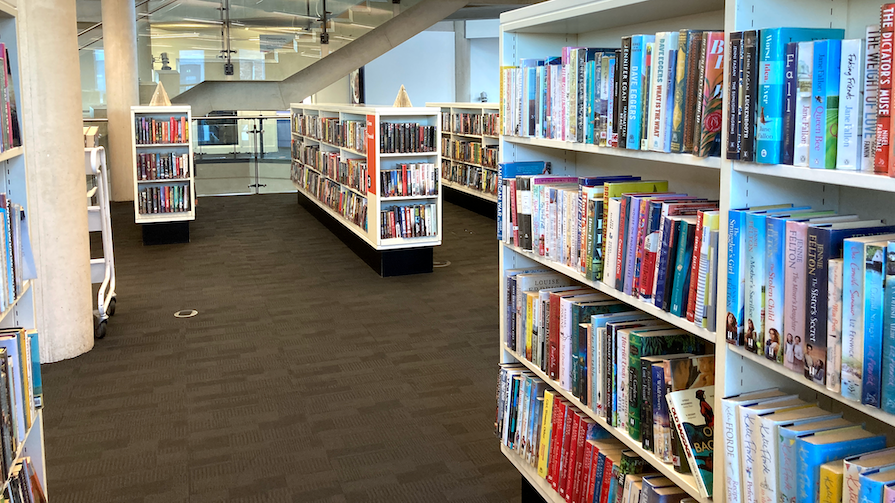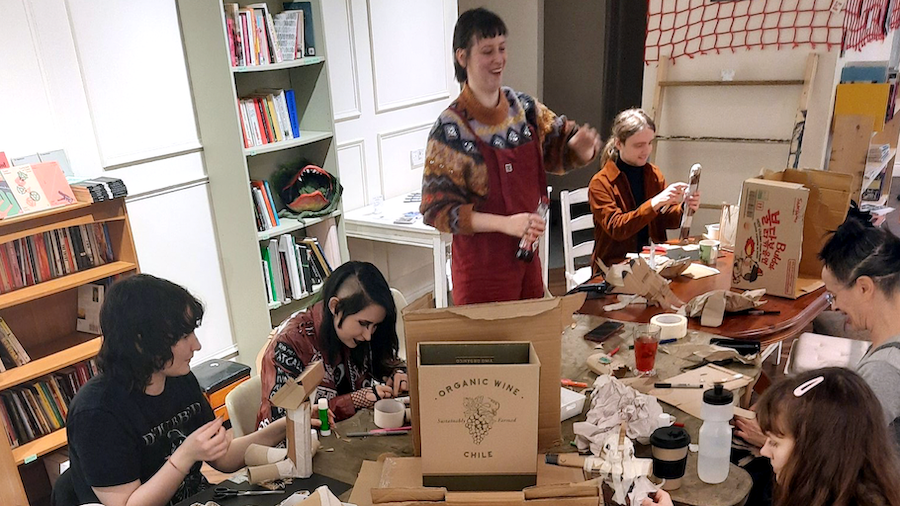As libraries in the capital transform into warm banks to tackle the cost-of-living crisis, council budget cuts threaten their survival

Walk into your local library and you’d expect to see shelves upon shelves of books. But what you might not expect to see is a group of knitters, a line of people receiving financial advice and a class teaching computer skills – often in the same building.
And in the last couple of months, Cardiff libraries have also become lifelines for those affected by the cost-of-living crisis, by providing a space for people to keep warm.
Warm Welcome Spaces is an initiative set up to connect the thousands of UK organisations who are opening their doors to those struggling to heat their homes this winter. While the campaign was started by the ChurchWorks Commission, a network of UK churches, participating spaces include libraries around the country.
Find out more about warm banks here:
This is a nationwide venture that is perhaps particularly necessary in Wales. The Cost-of-Living Report published by Public Health Wales in November this year says that the country already has higher levels of poverty compared to the rest of the UK, therefore the population is likely to be harder hit by the crisis.
In addition, the report explains that Wales’ housing is some of the least energy efficient in Europe, meaning it is more difficult and therefore more expensive to heat, and contributing to greater levels of fuel poverty.
Warm spaces were introduced in all 21 Cardiff libraries and hubs on 10 October, with free hot drinks, activities and financial advice available throughout the week. Andrea Currie, media advisor for Cardiff council, disclosed that as of 28 November, over 2,500 people have accessed the warm spaces in Cardiff libraries.
Twist in the tale
But while libraries are stepping forward to help those in need through the cost-of-living, this very crisis means the future of these spaces is under threat.
In October, Cardiff council revealed it was facing a £53m hole in its budget for 2023/24, with Cllr Chris Weaver saying in a statement, “There will inevitably be a need for savings that impact on service delivery.” An increase in funding for local authorities, announced by the local government settlement on 14 December, reduces this hole to £23m, but key services are still likely to be affected in the coming years.
The regional outlook supports this, with Public Health Wales arguing, “The cost-of-living crisis has potential consequences for maintaining current public service capacity and quality in Wales.” The loss of these services even presents a threat to health for those in the most deprived areas, according to the report.
National discussions around budget cuts have led to questions surrounding the contemporary worth of libraries, with journalist Andrew Pierce claiming on Good Morning Britain, “I haven’t been to a library in 30 years.” But how needed are libraries in Cardiff today?
Valued public spaces
In the recently published Welsh Libraries report of 2020/21, Cardiff libraries saw their total membership decline compared with 2019/20 as a result of the pandemic.
However, there was also a staggering 464% increase in digital downloads – suggesting people were still making use of the service’s resources even when they were more limited.
And the library buildings have great value as well, not just to core members but to groups who use the spaces for meetings and social events. Cardiff Writers Circle host regular writing workshops at Central Library, including a current series to mark the group’s 75th anniversary celebrations.

Member of the group Martin Buckridge says the library has been key to their schedule of events, as the only venue that met their requirements of having disabled access, being in a central location and being available for free.
“It seems to me that the Central Library provides a very important meeting facility of a type unique in the city centre,” he says.
“The library’s continued ability to work with local community groups in these challenging times will play a valuable part in helping to sustain the voluntary sector.”
The next chapter
But while these cuts may threaten the traditional library, perhaps in Cardiff there is a new future on the horizon. Last month, Dyddiau Du had its launch – a new queer, neurodivergent-led community library and art space located in the Capitol Centre.
While the initial plan was to open a bookshop, the end product was a library, deemed the most accessible way to reach people by its creators.
The library will tailor to the needs of the community, stocking books from writers of colour and the LGBT+ community, and covering themes of mental health and neurodivergence.

Joshua Jones, one of Dyddiau Du’s founders, says that while their facilities may differ from state-funded libraries, the space provides similar services, including a place inside from the cold.

Jones, 25, says that despite often having funding cut, libraries can be pillars of local communities, and have the power to shape someone’s view of the world.
“They are inherently socialist spaces,” he says. “Where else can a blind or visually impaired person discover audiobooks and books in Braille, or refugees take English lessons, or ex-offenders build their CV writing skills and use the printer?
“Libraries are important because they are by people, for the people.”
The full budget will be published by Cardiff council early next year, so the future of the libraries and other public services won’t be known for a while.
Libraries are important because they are by people, for the people
Joshua Jones
When you next walk into your local library, stop to notice the wealth of resources around you. Maybe even appreciate the warmth, something that many no longer take for granted. But also notice that these spaces are disappearing, at a time when they are perhaps more vital than ever.
